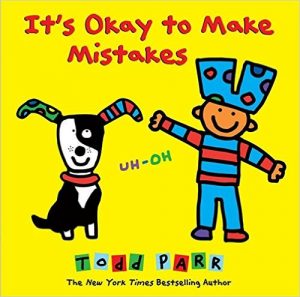 As a parent, mistakes, miscalls, misunderstandings, and miscalculations are inevitable. We all know that intellectually but still we beat ourselves up. Often we forget to respond with intention. (Remember the distinction between responding and reacting. The first is calculated and considered, the second is impulsive and emotion-fueled.)
As a parent, mistakes, miscalls, misunderstandings, and miscalculations are inevitable. We all know that intellectually but still we beat ourselves up. Often we forget to respond with intention. (Remember the distinction between responding and reacting. The first is calculated and considered, the second is impulsive and emotion-fueled.)
The typical conversation regarding mistakes focuses on how to learn from them as in “failing forward, using our failures as stepping-stones to choose better, be less reactionary and avoid repeating mistakes. All worthy goals. But let’s take a slightly different tack.
Consider how to use the way we handle our own mistakes as templates for our kids. Imagine we are showing them what to do after they’ve made a mistake. Because that is in fact the reality of parenting: we are perpetually performing the next installment of “Raising healthy, happy, successful children. Without an instruction manual. Without a course syllabus. Without a road map. We’re on our own.
We’ve had to discard the parenting model of our family of origin; it doesn’t fit the circumstance. So every member of the family is striving to understand how adoption uniquely shapes experience. And for most of us this is our first time traversing this world.
We struggle. We try. We fail. And we try again. We get discouraged. As Intentional Parents we expect and accept the struggle; we recommit. Until. We. Succeed: we find a pattern that works for us. Until. It. Doesn’t.
Take on a Practice
For two weeks, whenever you are wrestling to accomplish a challenge, learn a new skill or, deal with a difficult co-worker, fight the urge to procrastinate, try this. Like a young child, vocalize your inner dialog. Allow your kids to overhear your inner process, that conversation inside your head that wrestles with overwhelm, frustration and doubt to remind you of your goals and responsibilities and which helps you to resist temptation. Reveal the struggle and the various strategies you use to meet and defeat challenges.
In the absence of evidence to the contrary, kids assume this type of “adult” behavior comes easy for us. They assume that we learn without effort, enjoy doing chores, that our jobs are free of the relationship tensions that plague them on the schoolyard. To their eyes, it appears that we speed down the highway of life with few obstacles, road blocks, pot holes, and disappointments.
This practice of letting them experience our inner world accomplished two things. First, it defeats their assumption that we face no problems, Second, it models persistence through the use of many strategies, of digging deep into our “tool box” until we find the one that fits the particular circumstance.
A book suggestion
 If your children are young, consider reading Todd Parr’s It’s Okay to Make Mistakes
If your children are young, consider reading Todd Parr’s It’s Okay to Make Mistakes
Admittedly, we don’t generally wear our shorts on our heads or our socks on our ears like Parr’s characters, but we do take many “opportunities” to mess up. Every failure or misstep gives us an equal number of chances to practice getting it right.
How might this simple practice or processing things out loud benefit you and your family?
A noteworthy comment, we are always parents no matter what the age of our “children”. Letting our adult children make mistakes is not always easy to observe, and yet, it is vital to their growth and development. As parents, it is beneficial for us to remember that it is important to continue to enter their world and understand them as human beings. Intentional parenting continues throughout their life as well as ours.
Next week we’ll explore ways of “making it right.” Repairing damaged relationships is a vital skill which we all need to master. The children benefit also from the parents’ expression of vulnerability, and will learn the vulnerability is not a weakness but a strength.
Listen to our podcasts: Adoption Matters: Real People. Real Life. Real Talk and Essentials of Adoption Attuned Parenting
Read Books written by our coaches
Click to learn more about Adoption Attuned Certified coaching!



Instead of beating ourselves up over our mess ups, let’s think of mistakes as learning opportunities! There is a real cultural bias geared to perfection and yet we know that we are not perfect. Hooray for a book like It’s Okay to Make Mistakes that teaches early on the lesson that mistakes are a part of life and the continuous learning that is part of life being well lived. #adoption #adoptiveparenting #AAQ